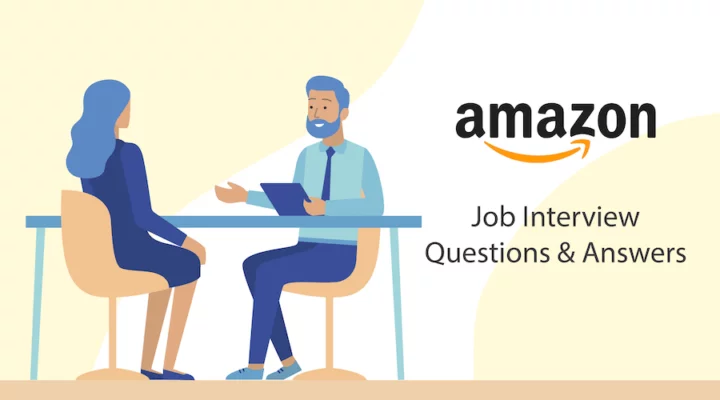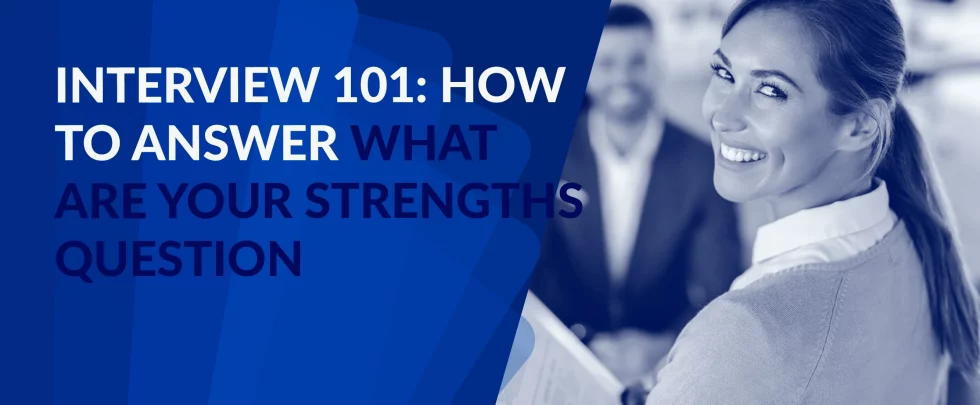Ever been stumped when a hiring manager asks you, What are your strengths question?
This question is one of the most common interview questions out there too, so it is important you know how to answer it! Be it Google or Amazon, you’re definitely going to be asked this elusive question in your interview sessions.
Even though it is a common question, it can be a difficult question to answer since we only have a limited amount of time to make an impression and let our strengths shine.
Before the What Are Your Strengths Question comes up, take some time to think ahead about your key strengths, prominent personality traits, and any technical skills that can help you craft the perfect response.
In this article, we will share different, creative ways that you can highlight your key strengths, and answer “What are your strengths question” in an interview and make a lasting impression.
We’ll look at factors like structure, storytelling, example-giving, and more!
You will walk away from this article with a better understanding of how to answer this ever-so-important interview question!
So, stick around to find out more about this!
Do you have an interview with Amazon?
Pro Tip
Make sure to check out our top-selling Amazon Interview Guide which comes with a full refund guarantee in case you fail your interviews.

Table of Contents
What Are Your Strengths Question: Why Saying Your Strength is Important
It’s very important to list your personal strengths when you’re answering the question “What are your strengths?” Doing so through a thoughtful answer reinforces your confidence and makes you more attractive in the eyes of potential employers.
Plus, listing your personal strengths is a great way to set yourself apart from all the other candidates who are vying for the same job.
Telling an employer what your unique abilities are during the hiring process can also help to showcase why you would be an invaluable asset to their company.
By emphasizing the skills, both soft skills and technical skills, that would be beneficial to them, such as leadership qualities or additional knowledge, you can win over any employer with your well-rounded skill set.
Not only will mentioning your strengths show how confident you are, but it’ll instantly showcase how capable you may be in achieving success at the job.
When it comes to interviewing for your dream job, it’s not just about listing off your qualifications and experience like a robot reciting its programming, no, it’s about selling yourself and highlighting the unique strengths that make you the perfect candidate for the job.
Think of your interview at your dream job like a date. You want to showcase your best assets and make yourself as attractive as possible to your potential employer.
And let’s be real, who doesn’t love a good sales pitch? Plus, by being able to confidently speak about your strengths, you’ll also come across as more competent and capable, so this is a natural skill that can work in your favor!
So, don’t be shy, toot your own horn and let your strengths shine during the interview process. It does not matter if you are answering behavioral interview questions or anything else, you can simply just go right at it!
Trust us, it’ll be worth it in the long run.

What Are Your Strengths Question: Why Do Interviewers Ask About Your Strengths
Interviewers ask about personal strengths as well as professional strengths for the same reason people go to the gym – to build muscle and see what you’re made of.
It’s like a personal trainer pushing you to lift that extra weight, except in this case, it’s your potential employer pushing you to showcase your best qualities and practical skills.
They want to see what you’re made of and how you can contribute to their team. Plus, it’s a great way to see if you’re just blowing hot air or if you can back up your claims.
And let’s be real, who doesn’t love a good workout? Especially when it comes to your career. It’s a chance to flex those professional muscles and show off your skills.
So, don’t be shy, let the interviewer know what you’re made of, and show them your strengths.
You’ll benefit from it in the long term, trust us.
What Are Your Strengths Question: Example Answers to What Are Your Strengths Question
The interviewer is essentially looking for an answer that gives them an accurate picture of your abilities and capabilities— both qualitative and quantitative skills.
For example, instead of saying “I’m good at problem-solving”, you could provide a more detailed story about a problem you faced in the past and how you solved it.
This type of response shows not only that you have specific skills, but that you also possess emotional intelligence and breadth of experience when presented with difficult situations.
Strengths give employers an idea of how resourceful you are in dealing with tough questions or decisions – something essential in any professional role. That’s why the what are your strengths question properly is very important.
Examples of Answers to the “What Are Your Strengths” Interview Question
In this section, we will discuss the nitty-gritty, along with sample answers.
So, here is a list of strengths you can mention in your next interview to achieve your career goal, with a little bit of elaboration for extra flavor.
You can also apply these to real-life examples in other show more of your personality to your hiring manager, and that you indeed possess the essential qualities the position requires!
Multitasking
Multitasking is a great strength to have in any professional role. It shows that you are able to juggle multiple tasks and responsibilities at once, even if there happens to be a challenging situation at hand, while still maintaining a high level of quality in your work.
This also shows your ability in handling stressful situations if they occur as the interviewer probably knows how startling stressful situations can be, so you have to prove you can handle them.
When discussing this strength, it’s important to provide concrete examples of how you have used multitasking in the past.
For example, you could talk about how you managed multiple projects simultaneously while working at your last job.
You can say:
“I’m a multitasker extraordinaire. I can juggle a million tasks at once without breaking a sweat. You should see me in a circus, it’s quite the spectacle.“
Or,
“I’m great at multitasking. At my last job, I was able to manage multiple projects simultaneously while still maintaining a high level of quality in my work.“
Or,
“I’m a pro at multitasking. I’ve been able to manage multiple projects and tasks at once while still meeting deadlines and delivering results.“
Great Listener
Great listening skills are essential in any professional role.
Being a great listener means being able to actively listen to others, understand their perspectives, and provide thoughtful feedback. It also shows that you are open-minded and willing to learn from others.
When discussing this strength, it’s important to provide concrete examples of how you have used your listening skills in the past.
For example, you could talk about how you actively listened to customer feedback and used it to improve the product or service.
For this you can respond with:
“I’m a great listener I’m all ears and I make sure to understand other people’s perspectives before offering my own. It’s a rare talent, like being able to touch your nose with your tongue.“
Or,
“I’m an excellent listener. I take the time to understand other people’s perspectives and use that information to make better decisions.“
Or,
“I’m a great listener. At my last job, I actively listened to customer feedback and used it to improve the product or service.“
Time management
Time management is an essential skill in any professional role. It shows that you are able to prioritize tasks, manage your time efficiently, and meet deadlines.
When discussing this strength, it’s important to provide concrete examples of how you have used your time management skills in the past.
For example, you could talk about how you managed to complete a project on time despite having limited resources or a tight deadline.
You can say:
“I’m a master of time management. I make sure to prioritize my tasks, and I’m always on time, like a Swiss watch.“
Or,
“I’m great at managing my time. At my last job, I was able to complete a project on time despite having limited resources and a tight deadline.“
Or,
“I’m an expert at time management. I know how to prioritize tasks and manage my time efficiently so that I can meet deadlines.“
Problem-solving
Problem-solving is a great strength to have in any professional role. It shows that you are able to think critically and come up with creative solutions to difficult problems.
When discussing this strength, it’s important to provide concrete examples of how you have used your problem-solving skills in the past.
For example, you could talk about how you identified a problem and developed an innovative solution that improved the efficiency of a process.
You can say:
“I’m a problem solver. I have a knack for finding solutions to even the most difficult problems, and I’m always willing to think outside the box. I’m like a human Rubik’s Cube, always finding the solution.“
There is also,
“I’m great at problem-solving. At my last job, I identified a problem and developed an innovative solution that improved the efficiency of a process.“
Or,
“I’m an expert at problem-solving. I’m able to think critically and come up with creative solutions to difficult problems.“
A team player
Being a team player is an essential strength to have in any professional role.
It shows that you are able to collaborate with others, work together towards a common goal, and support each other in times of need.
When discussing this strength, it’s important to provide concrete examples of how you have used your team-player skills in the past.
For example, you could talk about how you worked with a team to develop a successful project or how you supported your colleagues in times of need.
A good response for this would be:
“I’m a team player. I believe that there’s no “I” in “team” and I’ll do whatever it takes to make sure we all succeed together. I’m like a coach, I make sure everyone is in the game.”
Another one as well is,
“I’m great at working with teams. At my last job, I worked with a team to develop a successful project.“
Or,
“I’m an expert at being a team player. I’m able to collaborate with others, work together towards a common goal, and support each other in times of need.“
Leadership
Leadership is an essential strength to have in any professional role. It shows that you are able to take initiative, motivate others, and make decisions that benefit the team.
When discussing this strength, it’s important to provide concrete examples of how you have used your leadership skills in the past.
For example, you could talk about how you took charge of a project and successfully led your team to completion.
You can say:
“I’m a leader. I’m not afraid to take charge and make decisions when needed. I’m a captain, leading the ship to success.“
Or,
“I’m great at leading. At my last job, I took charge of a project and successfully led my team to completion.“
Or,
“I’m an expert at leadership. I’m able to take initiative, motivate others, and make decisions that benefit the team.“
Creativity
Creativity is an essential strength to have in any professional role.
It shows that you are able to think outside the box, come up with innovative solutions, and develop creative ideas.
When discussing this strength, it’s important to provide concrete examples of how you have used your creativity in the past.
For example, you could talk about how you developed a unique marketing campaign or how you came up with a creative solution to a difficult problem.
You can say:
“I’m a creative thinker. I see things from a different angle and come up with innovative solutions. I’m like a modern-day Picasso.“
Or,
“I’m great at being creative. At my last job, I developed a unique marketing campaign that was successful.“
Or,
“I’m an expert at creativity. I’m able to think outside the box, come up with innovative solutions, and develop creative ideas.“
Adaptability
Adaptability is an essential strength to have in any professional role.
It shows that you are able to adjust quickly to changing circumstances, think on your feet, and remain calm under pressure.
When discussing this strength, it’s important to provide concrete examples of how you have used your adaptability skills in the past.
For example, you could talk about how you handled a difficult situation with grace and poise or how you quickly adjusted to a new project.
You can say:
“I’m adaptable. I can roll with the punches and navigate changes with ease. I’m like a chameleon, I can adapt to any situation.“
Or this for example,
“I’m great at being adaptable. At my last job, I handled a difficult situation with grace and poise.“
Or,
“I’m an expert at adaptability. I’m able to adjust quickly to changing circumstances, think on my feet, and remain calm under pressure.“
Detail-oriented
Being detail-oriented is an essential strength to have in any professional role. It shows that you are able to pay attention to the small details, stay organized, and ensure accuracy in your work.
When discussing this strength, it’s important to provide concrete examples of how you have used your detail-oriented skills in the past.
For example, you could talk about how you double-checked a project to make sure it was error-free or how you stayed organized while managing multiple tasks.
You can say:
“I‘m detail-oriented. I catch things that others might miss and I make sure everything is done to the best of my abilities. I’m like a detective, always finding the hidden clues.“
Or,
“I’m great at being detail-oriented. At my last job, I double-checked a project to make sure it was error-free.“
Or,
“I’m an expert at being detail-oriented. I’m able to pay attention to the small details, stay organized, and ensure accuracy in my work.“
Organizational Skills
Organizational skills are an essential strength to have in any professional role. It shows that you are able to prioritize tasks, manage time efficiently, and stay on top of deadlines.
When discussing this strength, it’s important to provide concrete examples of how you have used your organizational skills in the past.
For example, you could talk about how you managed multiple projects at once or how you created a system to stay organized.
You can say:
“I’m great at organization. I’m able to prioritize tasks, manage time efficiently, and stay on top of deadlines. I’m like a conductor, keeping everything in order.“
Or this for example,
“I’m great at being organized. At my last job, I managed multiple projects at once and created a system to stay organized.“
Or,
“I’m an expert at organization. I’m able to prioritize tasks, manage time efficiently, and stay on top of deadlines.“
Dedication
Dedication is an essential strength to have in any professional role. It shows that you are able to stay focused, remains committed to the task at hand, and work hard to achieve your goals.
When discussing this strength, it’s important to provide concrete examples of how you have used your dedication in the past.
For example, you could talk about how you worked late nights to finish a project or how you stayed motivated despite setbacks.
You can say:
“I’m dedicated. I put my all into everything I do and I am committed to achieving my goals. I’m like a marathon runner, always pushing through to the finish line.”
Or,
“I’m great at being dedicated. At my last job, I worked late nights to finish a project.”
Or,
“I’m an expert at being dedicated. I’m able to stay focused, remain committed to the task at hand, and work hard to achieve my goals.”
Remember, it’s not just about saying your strength but also providing examples of how you have demonstrated that strength in the past!
Also Read; Tell Me About a Time Interview Questions
How to Answer What Are Your Strengths Question: Bottom line
When it comes to answering What are your strengths question in a job interview, it’s important to be honest and confident in your response.
Brainstorming creative answers can help you create an answer that stands out from the crowd and showcases the best of what you have to offer.
It may take some practice but with the right approach, you can impress your interviewer and land that job!
When it comes to answering “What are your strengths?” in a job interview, it’s important to be honest and confident in your response.
Brainstorming creative answers can help you create an answer that stands out from the crowd and showcases the best of what you have to offer.
It may take some practice but with the right approach, you can impress your interviewer and land that job!
At interviewjoy we help job seekers with their interview journey and help them with our top-rated interview guides so if you think you need professional support then feel free to check them.
Good luck!


